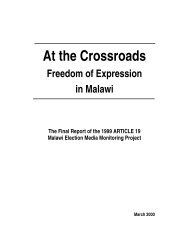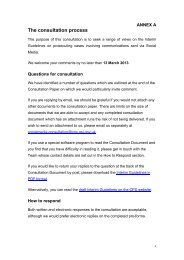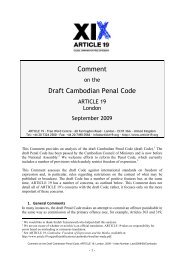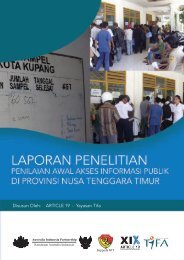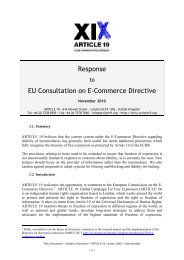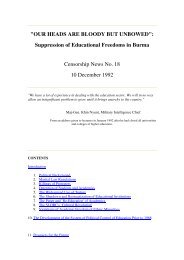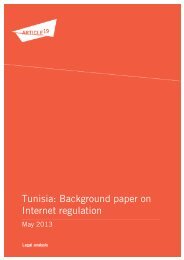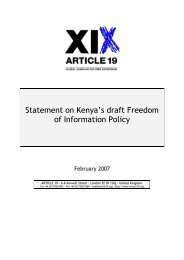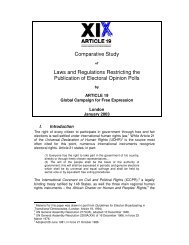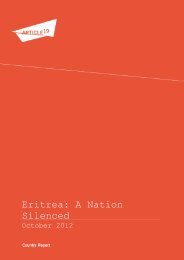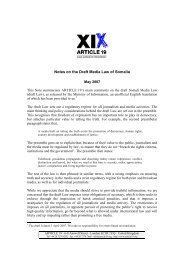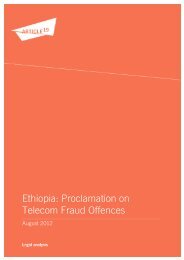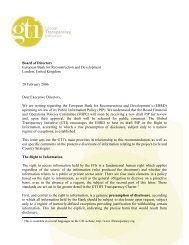FOR INTERNAL USE ONLY - Article 19
FOR INTERNAL USE ONLY - Article 19
FOR INTERNAL USE ONLY - Article 19
- No tags were found...
Create successful ePaper yourself
Turn your PDF publications into a flip-book with our unique Google optimized e-Paper software.
ARTICLE <strong>19</strong>GLOBAL CAMPAIGN <strong>FOR</strong> FREE EXPRESSIONof public interest, in many cases they fail to provide information that has been requested. In the case ofenvironmental information, they cannot easily justify refusing access on the grounds that it isclassified (as by law information on the state of the environment cannot be made secret orconfidential); as a result they give no reason for the refusal, provide incomplete information, or fail torespond to the request. As people cannot check what is and is not available, they cannot challenge theauthorities for not providing comprehensive information. Frequently, public bodies fail to provide theinformation according to the timeframe established by law. Often the information provided is notsufficiently detailed to allow proper public scrutiny. For example, the budget of the MEP is availablebut has only general headings; this is not sufficient for civil society to monitor and question publicspending.In some cases, legal documents have been adopted without consultation or even publicscrutiny. In 2006 the Cabinet of Ministers issued Decree No. 145-p, approving the Energy Strategy ofUkraine for the period until 2030. 240 Internet searches on the draft Strategy during the second half of2005 on the websites of those institutes involved in the Strategy’s development yielded only partialresults: only the Draft 7th Section of the Strategy was posted on the website of the State Committee ofEnergy Supply. Repeated public requests to receive the draft were either rejected or subject to delaysas requests were passed from one department to another. Even though the draft Strategy was discussedamong State authorities and international donor organisations, it was made public only shortly beforeits adoption.There is also no access to entire registries, such as the State Registry of Fauna. According toUkrainian legislation, 241 the Registry should comprise information on the geographic distribution ofspecies, their numbers and conditions, characteristics of their habitat and their use in modern farming,as well as other data necessary for the protection and rational use of fauna. The Registry should bepublished every five years and managed by the MEP. Yet MEP representatives have providedcontradictory information as to the existence of such a Registry: some say the Registry does not exist,even though according to other sources it has existed since <strong>19</strong>94. Others say that the Registry is in adatabase format that cannot be disseminated. If this is the case, it raises the question as to why it is notpublished or made public in another format so that it is accessible to all interested parties. 242240 Decree of the Cabinet of Ministers of Ukraine On the Approval of the Energy Strategy of Ukraine for thePeriod Until 2030, 15 March 2006, No.145-. The main body involved in the development of the Strategy wasthe Institute of General Energy at the National Academy of Sciences of Ukraine, with the participation of an adhoc commission with members from the Ministry of Fuel and Energy of Ukraine.241 <strong>Article</strong> 51 of the Law on Fauna and Decision of the Cabinet of Ministers of Ukraine On the Management of aRegistry of Fauna, 15 November <strong>19</strong>94, No.772, Collected Decisions of the Government of Ukraine, <strong>19</strong>95, No.1,p.27.242 Information from EcoPravo-Kyiv.For Internal Use Only. Is Post-Chornobyl Ukraine Ready for Access to Environmental Information?ARTICLE <strong>19</strong>, London, 2007',



